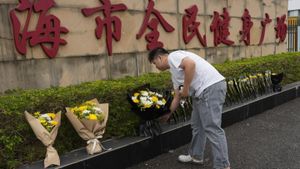The tension is palpable as Albania prepares for the upcoming protests surrounding the approval of the 2025 budget, set to go before the Assembly. Holding the spotlight is the leader of the opposition, Sali Berisha, who is raising urgent alarms about what he brands as the "biggest robbery of the year."
Berisha, speaking at a press conference, has called for citizens, including the elderly, farmers, and the unemployed, to take to the streets: "On the day of the biggest looting of the year, it’s imperative for us to raise our voices together. All those who are affected should stand within the parliament to express their discontent!" He emphasized this call to action, insisting on presenting amendments during the parliamentary sessions, fully aware they are likely to be ignored by the current government led by Prime Minister Edi Rama.
Challenging the government's commitment to economic responsibility, Berisha accused them of mishandling funds, criticizing the allocation of resources. "Only 16 million euros are set aside for pensioners, yet we see lavish expenditures and luxury from this government. They claim to support farmers, but the funds are funneled to sectors known for corruption," he stated.
The protests, according to Berisha, are not merely political theater but are backed by widespread frustrations among citizens facing economic hardships. He has urged people across the spectrum—small business owners, workers, and everyone feeling the weight of the government’s decisions—to participate actively. The plan is to surround the Parliament as lawmakers gather to debate the budget.
Further stoking the fire, he called the current budget proposal the outcome of systematic looting from the Albanian treasury by “the criminal organization” orchestrated by Edi Rama. This rhetoric is shaping the narrative for the protests, painting the budget as not just numbers on paper, but as reflective of broader societal issues including poverty and unemployment.
Meanwhile, other factions within the political spectrum are also voicing their dissent. Akhilesh Yadav, president of the Samajwadi Party (SP) and former Chief Minister of Uttar Pradesh, addressed similar themes during his remarks at public rallies. Yadav proclaimed, "Those who wield the stick now must bear the consequences of their actions; lathi-charges will not be tolerated by students anymore!" His comments come amid protests over changes to the UPPSC exam schedule.
Yadav’s protests focus on multiple shifts for civil service exams, leading to chaos during demonstrations where students clashed with police. The UPPSC aspirants demand transparency and fairness, advocating for single-shift exam schedules to alleviate their concerns over equitable access to exams. The handling of these protests has garnered national attention, with Yadav denouncing the ruling BJP’s oppressive tactics and threatening retaliation for any continued injustices against students.
Cross-reference to these protests is being made across various platforms as both Yadav’s and Berisha’s movements gain traction, reiterative of dissatisfaction among the younger populace and marginalized communities. The topics of budget allocation and government accountability are brewing discontent, laying the groundwork for significant demonstrations.
The upcoming demonstrations are pivotal, not only as political movements for the leaders involved but also as reflections of the societal discontent felt across various demographics. They showcase the grievances of citizens against government policies perceived as neglectful and mismanaged.
While Berisha and Yadav highlight the economic grievances of their constituents, safety and law enforcement agencies brace for potential escalations as public sentiment reaches its boiling point. Protests have historically served as flashpoints for political discourse and community mobilization. The joining of forces against perceived injustices may spark larger social reform conversations.
Both leaders’ calls for action signal to their respective bases the seriousness of the situation; the protests are more than mere displays of dissatisfaction; they represent the frustrations, aspirations, and urgency of the people whose lives are intertwined with governmental decisions. The eyes of the nation will be on Albania and Uttar Pradesh to see how these narratives evolve and what impact they may have on future political landscapes.



